How to Lower Hemoglobin
Hemoglobin levels rise when there is an increased concentration of red blood cells in the bloodstream. When too many red blood cells are present, it increases the risk of a blood clot forming, which could lead to a stroke or heart attack. For this reason, it's important to lower hemoglobin levels back to their normal range. Fortunately, there are ways to lower hemoglobin levels and reduce the risk of complications such as blood clots.
Ways to Lower Hemoglobin Level
Stop smoking. Smoking increases hemoglobin levels in both men and women, and the elevation in hemoglobin is higher in those who smoke more cigarettes. This occurs because smoking decreases oxygen delivery to body tissues, which causes the bone marrow to produce more red blood cells.
How to Boost Hemoglobin
Learn More
Get a chest x-ray. Lung disease is a common cause of high hemoglobin levels, because diseased lungs take in less oxygen. Like smoking, the oxygen deficit causes more red blood cells to be produced and an increased hemoglobin level. A chest x-ray can usually diagnose lung problems that may be contributing to a high hemoglobin level.
Drink more water. Dehydration is a common cause of an elevated hemoglobin level and can increase levels by 10 to 15%. Drink more non-caffeinated liquids, preferably water, to bring hemoglobin levels down.
Reasons for a Low Red Blood Count of 7.7
Learn More
Move to a lower elevation. People who live at greater elevations have higher hemoglobin levels. At higher elevations, the amount of oxygen in the air is reduced, and the body responds by producing more red-blood cells to increase its oxygen- carrying capacity. Returning to a lower elevation corrects the problem over time.
Get phlebotomy. Phlebotomy is a procedure in which red blood cells are removed from the body in a manner similar to donating blood. When red blood cells are taken out of the body, it lowers hemoglobin levels. Talk to your doctor about this procedure if your hemoglobin level is very high.
Get a complete physical exam. Medical conditions other than lung disease can cause an elevated hemoglobin, including liver disease, kidney disease, heart disease and a condition called polycythemia vera.
Warnings
Don't try to lower your hemoglobin level without finding out why it's high. See your doctor for testing.
Some medications can cause elevated hemoglobin levels. Discuss any medications you're taking with your doctor.
- Smoking increases hemoglobin levels in both men and women, and the elevation in hemoglobin is higher in those who smoke more cigarettes.
- At higher elevations, the amount of oxygen in the air is reduced, and the body responds by producing more red-blood cells to increase its oxygen- carrying capacity.
Related Articles
References
- J Appl Physiol 96: 1579-1580, 2004.
- University of Rochester Medical Center. Health Encyclopedia. What Are Red Blood Cells?
- Karakochuk CD, Hess SY, Moorthy D, et al. Measurement and interpretation of hemoglobin concentration in clinical and field settings: a narrative review. Ann N Y Acad Sci. 2019;1450(1):126-146. doi:10.1111/nyas.14003
- UptoDate. Patient education: Anemia caused by low iron in adults (Beyond the Basics). Updated April 9, 2019.
- U.S. National Library of Medicine. MedlinePlus. Hemoglobin Test. Updated July 31, 2020.
- U.S. National Library of Medicine. MedlinePlus. Thalassemia. Updated August 24, 2020.
- U.S. National Library of Medicine. MedlinePlus. RBC indices. Updated October 8, 2020.
Warnings
- Don't try to lower your hemoglobin level without finding out why it's high. See your doctor for testing.
- Some medications can cause elevated hemoglobin levels. Discuss any medications you're taking with your doctor.







